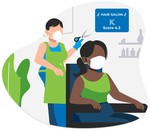
|
Listen To This Article
|
While businesses have been scrambling to pay rent, revamp procedures, secure extra cleaning products and hand sanitizer, and make every possible concession to adapt to a world with Covid-19, employers are also facing some daunting responsibilities when it comes to the health and economic wellbeing of their staff.
In order to navigate the layers of regulations and recommendations laid down at the federal, state, local, and industry levels, employers need to know where their obligations lie when it comes to Covid-19 and their employees, and how those obligations can affect business practices with regard to:
- Unemployment and job security
- Time off due to Covid-19
- Workplace health and safety
- Employee health privacy
Unemployment and job security during Covid-19
For some business owners, closing their doors was either a practical decision or mandated by state or local governments, and the options were to either lay off or furlough their staff.
A layoff officially ends the employee-employer business relationship. The business is responsible for giving the former employee their final wages and benefits payouts, and providing any necessary documentation regarding their employment with the company. Should the business reopen or increase staffing levels, they do not have to hire the same individuals that were laid off.
A furloughed employee stays attached to the business, but job duties have been put on hold. The employer is usually still responsible for paying the employer portion of health insurance premiums, retirement plans and other job benefits while the employee is unable to work. When the company is able to resume operations, the employee should return to work in the same capacity as before.
Furloughs can turn into permanent layoffs, but employers may have to give employees a certain amount of notice of layoff under the Worker Adjustment and Retraining Notification (WARN) Act.
Time off due to Covid-19
At the beginning of April, the Families First Coronavirus Response Act (FFCRA) was signed into law. The Act entitles employees to paid leave for reasons related to Covid-19, and allows eligible employers to be reimbursed for salaries paid under the FFCRA. Other leave and time off should still be based on existing government regulations and individual employment contracts.
The Act only applies to businesses with fewer than 500 employees, and certain businesses with less than 50 employees may also be exempt.
The full amount paid to the employee is eligible for reimbursement through tax credits, but the business has to cover the costs up front.
Workplace health and safety
OSHA, the U.S. Occupational Safety and Health Administration, has not issued any directives that specifically address Covid19.
As an employer, responsibilities for workplace health and safety during the pandemic still fall under the Occupational Health and Safety Act’s General Duty Clause. The clause requires employers to provide a “workplace free from recognized hazards likely to cause death or serious physical harm.”
Covid-19 is considered a “recognized hazard,” so complying with the Act includes mitigating risk of exposure to Covid-19 in the workplace. OSHA defers to CDC recommendations for how best to protect worker health and safety during the pandemic, and highlights existing standards that are particularly relevant to preventing the spread of Covid-19.
OSHA has also published a resource called Guidance on Preparing Workplaces for Covid-19. The guide includes recommendations for new cleaning protocols, personal protective equipment (PPE), and communicating changes to staff.
Klen App provides a unique platform for integrating ALL the regulations your particular business needs to follow in a single app that analyzes industry standards, federal, state and local mandates, saving valuable energy at a time when your business needs you the most.
Employee health and privacy during Covid-19
The U.S.Equal Employment Opportunity Commission (EEOC) officially supports CDC and public health agency initiatives that are meant to protect employees and the public by limiting the spread of the novel coronavirus.
Because the CDC and public health authorities have determined that having someone in the workplace that has contracted Covid-19 is a “direct threat” to others, businesses can take non-discriminatory steps to keep the virus out of the workplace.
Health initiatives might include things like routine temperature screening, asking employees to stay home if they have certain symptoms, contact tracing, and informing local health authorities of a potential outbreak.
Employers are still required to keep individual employee health information confidential, and to generally ensure a fair and equitable workplace during the Covid-19 pandemic.
Evolving standards and regulations
All 50 states have started to reopen, in phases and to varying degrees and with different business regulations addressing the risk posed by the novel coronavirus.
New York State, for example, requires businesses to create a Safety Plan that includes wearing face coverings where physical distancing is not possible, enhanced hygiene and cleaning protocols, as well as the mandatory provision of PPE for employees in certain industries.
California has created the Employer Playbook for a Safe Reopening, as well as a site that specifies industry-specific requirements, and emphasizes that most counties and cities in California have implemented additional regulations.
The National Federation of Independent Businesses ( NFIB) provides a Covid-19 FAQ for small business and up-to-date information regarding state mandates, closures and reopening information.
Klen App offers an alternative to sifting through that information, using a powerful proprietary AI to analyze and integrate federal, state, local, and industry regulations into one comprehensive application. This can simplify the reopening process, and at the same time reassure your employees and customers that your business is doing its absolute best to follow protocols and mitigate the risk of Covid-19.
Small Business Trendsetters Contributor
Discovering Innovators and Leaders in Business, Technology, Health and Personal Development.

